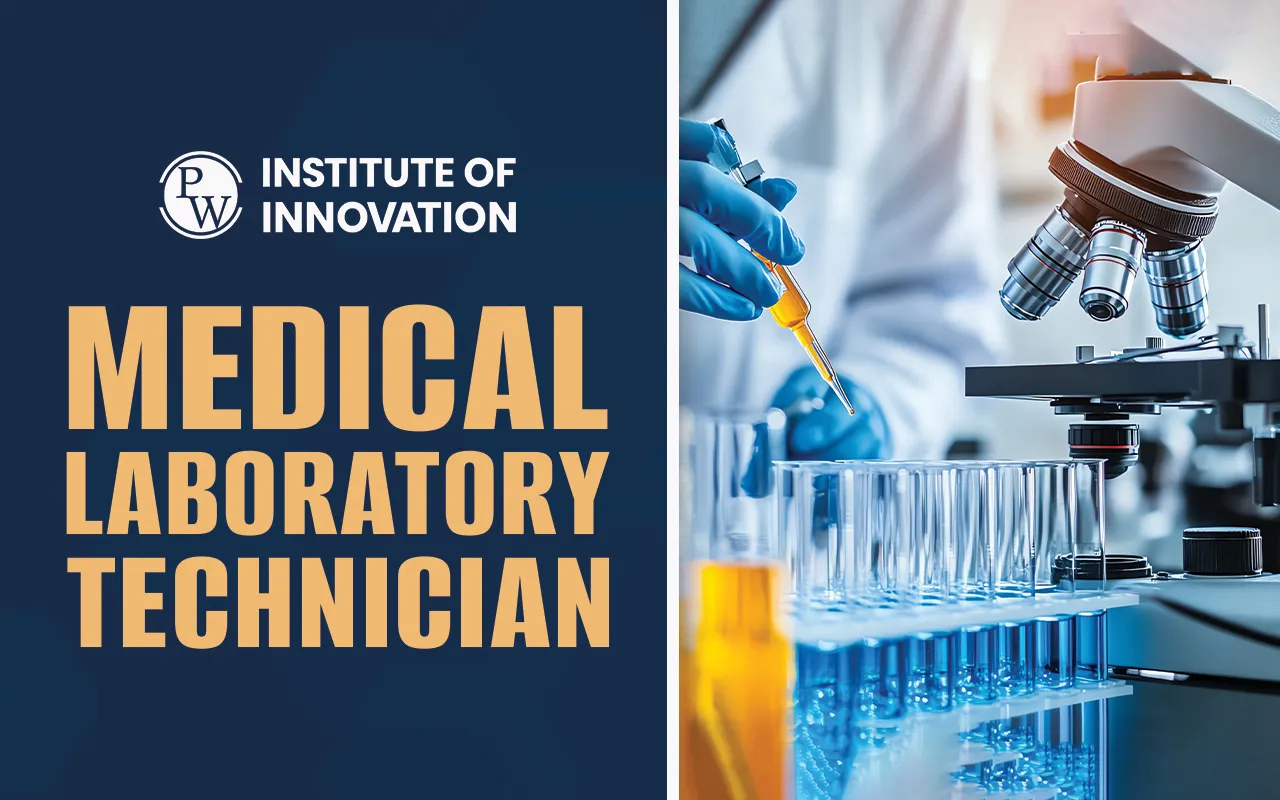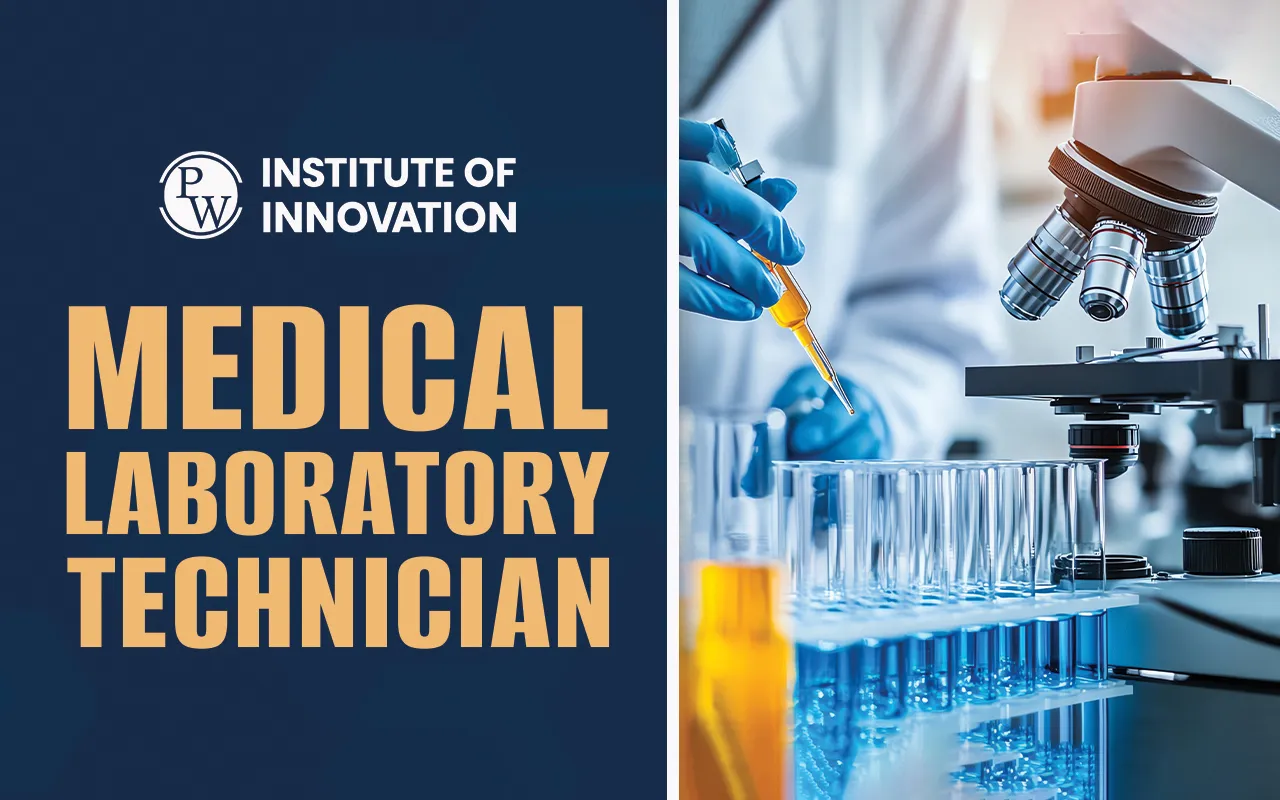
Becoming a Medical Laboratory Technician (MLT) is ideal when you want health care that incorporates science, technology, and patient care. But what does a medical laboratory technician do? And how do you become one? In this article, we will extensively discuss the responsibilities of a medical laboratory technician and what steps to take in order to start a career as one.
Who Is a Medical Laboratory Technician? The Unsung Hero of Health Sector
Medical Laboratory Technicians are one of the vital healthcare professionals who carry out an investigation of blood, tissue, and other body fluids to diagnose and treat illnesses to doctors. It is Medical Laboratory Technicians who end up serving in behind-the-scenes labs where proper test findings contribute towards the medical decision process in patient care.
Medical Laboratory Technicians do not typically meet patients face-to-face, unlike nurses or doctors. Their entire time is spent operating lab equipment, analyzing samples, and ensuring precision in every examination. From routine check-ups to critical disease detection, they support the entire process.
A Day in the Life of a Medical Laboratory Technician
Ever imagine how a day in the life of a Medical Laboratory Technician looks like? Work for a Medical Laboratory Technician is fast-paced and attention-oriented. Mornings would commonly start calibrating lab instruments, preparing samples, and running diagnostic tests.
By early afternoon, they may spend their time investigating blood cultures for any evidence of infection or cross-matching blood for transfusion. The afternoon might include writing findings, resolving equipment problems, or talking with pathologists. All these tasks are important-Medical Laboratory Technicians guarantee that doctors get the right data to make life-saving decisions.
Medical Laboratory Technician Responsibilities: More Than the Test Tube
A Medical Laboratory Technician's daily tasks cover a wide variety and need a good eye for detail. Some of the important responsibilities of a Medical Laboratory Technician are collecting and analyzing samples from tests, blood testing, abnormal cell identification, and laboratory equipment maintenance.
Also, Medical Laboratory Technicians are putting down their data, following safety protocols, and working with pathologists and other healthcare professionals.
5 Compelling Reasons Why You Should Choose Medical Laboratory Technician as a Career
For those passionate about science and problem-solving, a career as a Medical Laboratory Technician offers stability, prospects for growth, and fulfillment towards contributing to the healthcare sector. This career is unique in the following ways:
High Demand – With the increasing aging population and recent advances in medical testing, the demand for Medical Laboratory Technicians is increasing more rapidly than the average.
- Quick Entry- Unlike many of the healthcare careers that take 4+ years in schooling, it would take as little as 1 to 3 years to become a Medical Laboratory Technician.
-
Job Variety- Work with hospitals, research laboratories, clinics, or even forensic labs-no two days are the same.
-
Attractive Salary- Earn a steady income with many opportunities for advancement.
-
Feel-good Work- Your tests will help find diseases earlier, so you can save lives.
Steps on Becoming a Medical Laboratory Technician: Your Step-by-Step Roadmap
Education, certification, and hands-on training will make you a Medical Laboratory Technician. Here is a step by step approach toward the same:
1. Earn a High School Diploma or GED (Foundation)
Completing high school or getting a GED is the first step you will have to make to become a Medical Laboratory Technician. Focus on sciences like biology, chemistry, and math for maximum foundational benefit. Other than this, any stream student can pursue this course.
2. Complete an Accredited MLT Program (Your Chance at the Fast Track into the Lab)
Then, you would have to be enrolled in an accredited Medical Laboratory Technician program, maybe an associate program or a post-secondary certificate. Such programs will generally last between 1 and 2 years and will teach you about subjects such as microbiology, hematology, and clinical chemistry.
3. Go Into Clinical Training for Your Hands-On Experience (Real Field Training)
Most programs run a clinical internship, where you actually get to work in a real lab and under supervision. Invaluable experience is gained in knowing what a Medical Laboratory Technician does and seeing how things work on a daily basis.
4. Get Certified (Your Allen for Better Jobs):
Depending on the state, requirements differ; however, most employers prefer certified Medical Laboratory Technicians. Certification from the American Society for Clinical Pathology (ASCP), among others, enhances job prospects.
5. Apply for Jobs and Advance to Higher Positions (The Exciting Next Step)
You can begin applying for positions as a Medical Laboratory Technician after being certified. As you gain experience, you can specialize in particular areas like immunology or molecular biology, or pursue an advanced education to become a Medical Laboratory Scientist.
Essential Skills Every Medical Laboratory Technician Requires
In addition to this technical knowledge, Medical Laboratory Technicians have the following qualities:
- Analytical Thinking Interpreting complex test results accurately.
-
Attention to Detail A single mistake could affect a patient's diagnosis.
-
Technical Proficiency Operating advanced lab equipment precisely.
-
Time Management - Handling numerous tests efficiently and under time constraints.
-
Communication Skills - Engagement with doctors and lab staff.
Where Do Medical Laboratory Technicians Work?
While most Medical Laboratory Technicians tend to work in hospitals or diagnostic labs, the chances actually go beyond these defined spaces
-
Research Labs-Contributing towards the medical breakthrough.
-
Public Health Agencies-Watching outbreaks.
-
Forensic Labs-For helping solve crimes.
-
Pharmaceutical Companies-Testing new drugs.
-
Veterinary Clinics-Analysis of animal samples.
Job Outlook and Salary: Is This Career Financially Rewarding?
The outlook for the profession of Medical Laboratory Technicians remains promising on vigorous prospects as the Bureau of Labor Statistics raises the growth from 5% in 2022 to 2032. The average salary level varies from
2.5 - 4LPA in specialized fields or metropolitan areas.
Specializations for Medical Laboratory Technicians
The few specializations are as follows
- Clinical Chemistry (Analyzing body fluids for diseases)
-
Hematology (Studying blood disorders)
-
Microbiology (Detecting bacteria and viruses)
-
Immunology (Examining immune system responses)
-
Molecular Biology (Working with DNA testing)
Is a Medical Laboratory Technician Career Right For You?
If you are detail-oriented, like science, and looking for an interesting and rewarding career in the healthcare field without too much schooling, this can be the right choice for you. It offers several job opportunities and decent salaries.
Now, are you ready to get started? Let’s dive more into this.
B.Voc program- A Stronger Choice
If medical laboratory sciences is your career of choice, you must be weighing traditional Medical Laboratory Technician (MLT) diploma programs and B.ch programs in correlated fields. While both programs may get you into the laboratory, a B.Voc program will win by a landslide when it comes to career advancement, earning potential, and professional opportunities.
Do you need help with your homework or preparing for exams?
Study without using the internet
Our Campuses – Where Learning Meets Life
At PW IOI School of Healthcare, a vibrant, resource-rich campus experience plays a big role in shaping future professionals. Our healthcare programs are offered at two state-of-the-art campuses:
Lucknow Campus
A blend of academic excellence and cultural richness, our Lucknow campus offers modern labs, healthcare training facilities, and a peaceful learning environment.
Noida Campus
Our Noida campus is nestled in one of India’s fastest-growing urban hubs—ideal for exposure to hospitals, tech-driven healthcare, and clinical internships.
Both campuses are equipped with:
-
Fully functional labs & simulation rooms
-
Experienced faculty & medical practitioners
-
Lenovo tablets provided for smart learning
Fee Structure – Transparent Overview
As above, you can see a detailed 3-year fee structure for B.Voc programs at the School of Healthcare
Note:
-
Scholarships up to 100% are available based on CEE performance and 10th & 12th marks.
-
Hostel & mess charges (if applicable) may vary by campus.
Why a B.Voc is better than a conventional MLT diploma?
-
More Scientific Input & Advanced Skills
Traditional MLT Courses:
-
Usually 1-2 year diplomas or associate programs
-
Focus on basic lab procedures and routine testing
-
Limited exposure to advanced diagnostics or research
B.Voc Program Advantages.
3-Year program- Program In-Depth Subject Matter Knowledge:
-
Molecular diagnostics
-
Advanced hematology & pathology
-
Biomedical instrumentation
-
Research methodologies
-
Hands-on training with cutting-edge lab technology
-
Stronger foundation in biochemistry, genetics, and data analysis
2. Better Career Growth & Higher Salaries
MLT Diploma Limitations:
-
MLT graduates are often stuck in technician roles
-
Slow promotion tracks to supervisory positions
-
Lower starting salaries
B.Voc Career Benefits:
-
Higher starting salaries
-
Faster promotions to lab manager, quality control officer, or research roles
-
Global opportunities
3. Specialize & Research
B.Voc studies permitting specialization in:
-
Clinical Research
-
Molecular Diagnostics
-
Medical Biotechnology
-
Lab Data Science & AI
4. More Choices
-
MLT Diploma jobs are limited to
-
Hospital laboratories
-
Diagnostic centers
-
Blood banks
B.Voc Graduate Opportunities:
-
Drug testing & development with pharmaceutical companies
-
Forensic labs for crime scene DNA analysis
-
Medical innovation in biotech startups
-
Disease research for public health organizations
5. Robust Pathway to Higher Education
Importance of B.Voc in Further Studies:
-
Directly eligible for MSc/Masters in Biotechnology, Biochemistry, or Lab Sciences
-
Might even pursue MBA in Healthcare Management
-
The world over accepts Master's programs easy with a 4-year program
-
Long-term Benefit: A B.Voc opens doors for research, teaching, or corporate leadership roles later in your career.
Choose a B.Voc Program If You Want
-
Higher salary & leadership roles
-
Research and innovation opportunities
-
Flexibility to switch to biotech, pharma, or healthcare IT
-
Global career mobility
PW IOI's B.Voc Program: An Alternative Strengthening the Conventional MLT Courses.
Most Medical Laboratory Technology course begin their careers with a 2-year diploma or associate program. PW IOI's B.Voc Program, however, is a 3-year program and focuses on:
-
Technical Advancements
-
Research methodologies
-
Data analysis
-
Problem-solving skills
With PW’s IOI Certification get industry ready
As a result, you not only qualify as a Medical Laboratory Technician but also get the chance to take on supervisory roles, research positions, or branch out into medical technology innovation.
Get trained under our skilled mentors.
FAQs
Can a medical laboratory technician work abroad?
Is NEET compulsory to become a Medical Laboratory Technician?
What is the salary of a Medical Laboratory Technician in India?
Is medical laboratory technician an exhausting job?

